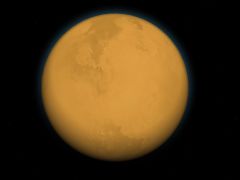Difference between revisions of "Titan"
(Added table. Updating parameters.) |
(Added template, content.) |
||
| Line 20: | Line 20: | ||
|width="30%"|Eccentricity (e)||align="right" width="30%"|0.0286455635677465 | |width="30%"|Eccentricity (e)||align="right" width="30%"|0.0286455635677465 | ||
|- | |- | ||
| − | |width="30%"|Inclination (i)||align="right" width="30%"| | + | |width="30%"|Inclination (i)||align="right" width="30%"|27.71621075° <br> (0.48373913369302 radian) |
|- | |- | ||
| − | |width="30%"|Longitude of the ascending node (LAN, ☊)||align="right" width="30%"| | + | |width="30%"|Longitude of the ascending node (LAN, ☊)||align="right" width="30%"|169.1427802° <br> (2.95209842121588 radian) |
|- | |- | ||
| − | |width="30%"|Longitude of periapsis (ϖ)||align="right" width="30%"| | + | |width="30%"|Longitude of periapsis (ϖ)||align="right" width="30%"|336.2491384° <br> (5.86865457209081 radian) |
|- | |- | ||
| − | |width="30%"|Mean longitude (L)||align="right" width="30%"| | + | |width="30%"|Mean longitude (L)||align="right" width="30%"|143.0542442° <br> (8.77995287671279 radian) |
|- | |- | ||
!bgcolor="lightsteelblue" colspan="2"|Selected physical parameters | !bgcolor="lightsteelblue" colspan="2"|Selected physical parameters | ||
|- | |- | ||
| − | |width="30%"|Mean radius||align="right" width="30%"| | + | |width="30%"|Mean radius||align="right" width="30%"|2575000 km |
|- | |- | ||
| − | |width="30%"|Mass||align="right" width="30%"|1. | + | |width="30%"|Mass||align="right" width="30%"|1.35×10<sup>23</sup> kg |
|- | |- | ||
!bgcolor="lightsteelblue" colspan="2"|Rotation elements | !bgcolor="lightsteelblue" colspan="2"|Rotation elements | ||
|- | |- | ||
| − | |width="30%"|SidRotPeriod||align="right" width="30%"| | + | |width="30%"|SidRotPeriod||align="right" width="30%"|1377959 seconds (382.766 hours) |
|- | |- | ||
|width="30%"|SidRotOffset||align="right" width="30%"|0 | |width="30%"|SidRotOffset||align="right" width="30%"|0 | ||
|- | |- | ||
| − | |width="30%"|Obliqutiy||align="right" width="30%"|0 | + | |width="30%"|Obliqutiy||align="right" width="30%"|0.4895 |
|- | |- | ||
| − | |width="30%"|LAN||align="right" width="30%"| | + | |width="30%"|LAN||align="right" width="30%"|6.09808 |
|- | |- | ||
| − | |width="30%"|Note||align="right" width="30%"|*Elements given are from | + | |width="30%"|Note||align="right" width="30%"|*Elements given are from Titan.cfg (2005) |
|} | |} | ||
| − | '''Titan''' is the largest moon of [[Saturn]]. It is | + | '''Titan''' is the largest moon of [[Saturn]], and was introduced to [[Orbiter]] with Orbiter 2002. It is the second largest moon in the [[Solar System]] and boasts an atmosphere about 1.45 as dense as that of [[Earth]]. Titan was discovered on 25 March 1655 by [[w:Christiaan Huygens]] who named it ''Saturni Luna'', but the name ''Titan'' was applied [[w:John Herschel]] and that name stuck. |
| − | [ | + | == Titan in Orbiter == |
| + | Saturn orbits [[Saturn]] about once every 1.6 Earth days at a distance of 10.5 Saturn diameters. It is tidally locked to Saturn, the same face toward Saturn. | ||
| + | |||
| + | == See also == | ||
| + | [[w:Saturn|Saturn]] at [[w:Wikipedia|Wikipedia]] | ||
[[Category: Celestial bodies]] | [[Category: Celestial bodies]] | ||
Revision as of 13:39, 13 July 2024
| Titan | |
|---|---|

| |
| Callisto in Orbiter 2016 with D3D9 client | |
| Designation | |
| Name | Titan |
| Reference body | Saturn |
| Planetary mean orbits | |
| Epoch | 2005.41409993155 |
| Semimajor axis (a) | 1221971852.3956 m |
| Eccentricity (e) | 0.0286455635677465 |
| Inclination (i) | 27.71621075° (0.48373913369302 radian) |
| Longitude of the ascending node (LAN, ☊) | 169.1427802° (2.95209842121588 radian) |
| Longitude of periapsis (ϖ) | 336.2491384° (5.86865457209081 radian) |
| Mean longitude (L) | 143.0542442° (8.77995287671279 radian) |
| Selected physical parameters | |
| Mean radius | 2575000 km |
| Mass | 1.35×1023 kg |
| Rotation elements | |
| SidRotPeriod | 1377959 seconds (382.766 hours) |
| SidRotOffset | 0 |
| Obliqutiy | 0.4895 |
| LAN | 6.09808 |
| Note | *Elements given are from Titan.cfg (2005) |
Titan is the largest moon of Saturn, and was introduced to Orbiter with Orbiter 2002. It is the second largest moon in the Solar System and boasts an atmosphere about 1.45 as dense as that of Earth. Titan was discovered on 25 March 1655 by w:Christiaan Huygens who named it Saturni Luna, but the name Titan was applied w:John Herschel and that name stuck.
Titan in Orbiter
Saturn orbits Saturn about once every 1.6 Earth days at a distance of 10.5 Saturn diameters. It is tidally locked to Saturn, the same face toward Saturn.
See also
The Outer Planets Titan Atmosphere Enhancement Huygens
| edit The Solar System | |
|---|---|
| Central star |
Sun (Sol) |
| Planets |
Mercury - Venus - Earth - Mars - Jupiter - Saturn - Uranus - Neptune |
| Natural satellites |
Moon - Phobos - Deimos - Io - Europa - Ganymede - Titan - more... |
| Add-ons |
Planets - Dwarf Planets - Small objects - Natural satellites - Alternative star systems |
 | This natural satellite related article is a stub. You can help Orbiterwiki by expanding it.
|